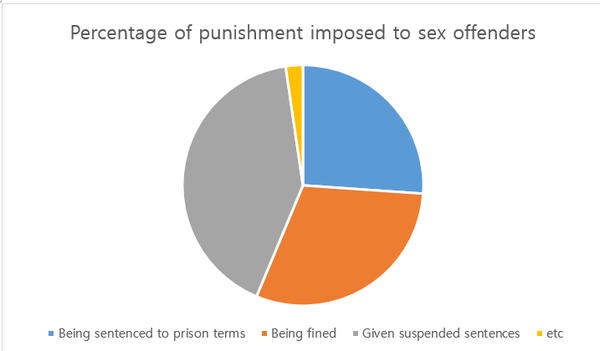
On September 3, a male university student was found dead. He was revealed to be a sex offender according to 'Digital Prison' but had consistently maintained his innocence. Some users from the online community of his school insisted he was innocent and also a victim of Digital Prison. They voiced their outrage at the existence of the website. However, many other people said they had no problem with Digital Prison. The disclosure of personal data on Digital Prison has become a heated debate.

Screenshot of Digital Prison
The appearance of ‘Dike’ on the Internet
Digital Prison is a website that discloses the personal information of criminals who commit serious offenses, especially sex crimes. The groundwork for Digital Prison was laid in March of this year, and its original purpose was to publicly release the personal information of sex offenders involved in the Telegram "Nth room". Before the launch of the website, suspected criminals had their identities revealed to the public on a number of Instagram accounts named "@nbunbang". These accounts were the foundation for the Digital Prison website. The Instagram accounts were closed under privacy laws, so operators of those accounts created a website in June in order to continue with the release of individuals' identities. The newly created Digital Prison website is registered in a Russian domain, which makes it nearly impossible to identify the website's operators. Since its opening, the website has disclosed the personal information of more than 100 perpetrators of violent crimes such as murder and sex crimes. The list of perpetrators who have been publicly announced includes a prestigious university student, a Cyber undertaker who once sought to reveal suspects in the "Nth room" crime, and high school students. The public was shocked at the disclosed information because some of the criminals seemed like everyday people and were even considered good citizens.
Nevertheless, the shock did not hamper public support for Digital Prison. Digital Prison has enabled the public to settle grievances that have been raised regarding the judiciary's judgment. Korean courts have had a tendency to give only light punishments to criminals involved in sex crimes. For instance, the court once sentenced a serious sex offender to less than four years in prison. This was the sentence for "Watchman," a criminal in the ''Nth Room'' crime. Also, the court only sentenced Son Jungwoo, a child sexual exploitation website operator, to just one and a half years in prison. In addition, the courts do not disclose the criminal's personal information such as their appearance or residence. This lack of disclosure has angered many in the public, so they look to Digital Prison for the information. An Jaeyeong (Gongju National University of Education '19), who was angered at such light punishments by Korean courts, supports Digital Prison. An said, ''As a student who dreams of becoming a teacher one day, I think the public has the right to know the identities of convicted criminals. Especially, it is necessary to disclose information of criminals involved in child sexual offenses in order to protect children. Also, by disclosing criminals' personal information on Digital Prison, criminals will be ‘genuinely’ judged by the public, and they will surely feel ashamed.'' As An stated, Digital Prison can act as a means of public protection and as a deterrent to others who may be considering committing a crime.

Digital Prison comes under fire
Digital Prison can cause many ill side effects. One of the most common is the release of falsely accused persons' information. In other words, it can harm the innocent. Since Digital Prison is run privately by individuals, the personal information posted in Digital Prison cannot be trusted as fully reliable. The website does not offer any information on how the criminal's personal information was obtained or whether the information is accurate. As such, innocent people could be falsely harmed, especially if the identity is based on reports from individuals or hearsay. For example, Professor Chae Jungho from the Department of Psychiatry at the Catholic University of Medicine had to prove his innocence after undergoing a thorough police investigation. Eventually, he was found innocent, but he suffered tremendous damage from having his personal information disclosed on Digital Prison. He said, "I was a mental health expert, but the strain and stress were even too much for me to bear. I suffered the same anxiety that one feels in prison."1) Like the Chae case, there is no compensation for an individual who is injured from falsely releasing private information on Digital Prison even though the person is found innocent of the charge after an investigation. The release of information is done by private individuals, so there will always be a chance of false information being posted. There is almost no way to hold the website responsible if the information leaked is wrong.
Another side effect of Digital Prison is that the website's disclosure of personal information constitutes defamation, which is considered a criminal offense. Currently, the National Police Agency is investigating Digital Prison on charges of violating the Information and Communication Network Act. While Digital Prison attempts to positively affect citizen's lives by guaranteeing their right to know, it violates the law and sways public opinion without being a national judicial body. That is, it is not a formal judgment, only personal views. Besides identifying the criminal, Digital Prison posts personal information on judges who they feel have given inappropriate sentences to sex offenders. The case of Kang Youngsoo, a senior judge at the Seoul Central District Court, who decided not to repatriate Son Jungwoo, operator of the world's largest child sexual exploitation website "Welcome To Video'' is one example. Kang's personal information was uploaded onto the Internet along with abusive and threatening comments insulting him and his family over his judgment. This caused some to argue that Digital Prison was encouraging vigilante revenge and doubling the punishment given to criminals, which can be illegal under the legislation. A bigger concern that was put forward is that the personal information uploaded onto Digital Prison was about Kang Youngsoo, a judge, not a criminal. Commenting on this, Han Sanghee, a professor at Konkuk University's Graduate School of Law, said, "If we allow for vigilante revenge or punishment, social order will fall into ruin. Digital Prison cannot be trusted as a legitimate source of information because it focuses on branding and punishing people rather than on public interest such as raising awareness among society.''2) In other words, a complete belief in Digital Prison’s disclosure of information can be dangerous.

Digital Prison expands, but it’s based on inappropriate judgments
While Digital Prison is not without faults, before dismissing its operation as a violation of human rights and an offense, it is necessary to consider the background and initial purpose of its foundation. The operator of Digital Prison said, "I am angry about the continuing lenient punishments malicious criminals in Korea receive. The purpose of Digital Prison is to make their personal information known to the public so that they can be judged socially." This statement presents the reasons why the operators of the Digital Prison are stepping up efforts to disclose the personal information of sex offenders at the risk of doing something illegal. It is viewed as a way of supplementing the "poor punishments for sex crimes in Korea." According to the '2020 white paper on sex crimes' released by the Ministry of Justice, only 26.1% of 74,956 criminals involved in sex crime cases were sentenced to prison terms from 2008 to 2018. On the other hand, 71.6% were fined and given suspended sentences. Over time, the number of sex crimes has increased and the seriousness of crimes has also become worsen. According to the '2019 Crime Analysis' released by the Supreme Prosecutors' Office, the number of violent sexual crimes was 17,377 in 2009, but the number increased to 32,104 in 2018.3) In other words, violent sex crimes have doubled in nine years, clearly showing that the Korean judiciary is not appropriately punishing criminals for sex crimes.
Frequent lenient punishments, especially for sex crimes, are causing many in society, especially females, to suffer heightened anxiety. The Sexual Offender Notification Website, which is currently run by the Ministry of Gender Equality and Family, functions as a Digital Prison by disclosing the identities of sex offenders to citizens. However, many people have pointed out the website's ineffectiveness, in particular its limited disclosure. Because of these and other reasons, Digital Prison, which fully discloses information on the identities of sex offenders is viewed as a "hero" as it reduces citizens' anxiety. Considering the reaction of the public, the government initially announced it would not shut down Digital Prison. During an emergency review held on September 15, the Korea Communications Standards Commission decided not to block the site. Instead, the Commission decided to block 19% of the site's total posting information through a request for a correction on 17 of Digital Prison's postings. However, ten days after this announcement, the Commission changed its decision and said it would completely shut down Digital Prison. The Commission claimed, "Freedom of expression needs to be protected as much as possible. However, it should not be used as a tool for abusing the current judicial system. Posting of various personal information on Digital Prison can lead to double punishment and also harm innocent individuals". Some people opposed the final decision, saying that the government ought to spend more time investigating serious sex crimes so that there would be no need for Digital Prison.
A time for reflection and improvement
Although Digital Prison guarantees citizens' right to know, it can also harm innocent people by damaging one's privacy and spreading false information. However, before regulating and dismissing Digital Prison as violating human rights, the background and initial purpose of Digital Prison should first be given consideration. In other words, it is necessary to reflect on and improve the judiciary's punishments for sex offenders.
1) Park Minki, ''A Professor Who Proved Himself a Victim of "Digital Prison Slander"..."What About My Damaged Honor?"'', Newsis, September 9, 2020
2) Koo Chaeeun, "Only 17 out of 89 Cases Are Blocked. Digital Prison 'Exemption' Controversy'', Asiae, September 15, 2020
3) Lee Jungyoon, "Digital Prison and Scarlet Letter Debate, Monsters We Raised," Asiae, July 9, 2020
Kim Han Yujin / Woman Section Editor
smt_hyj@sookmyung.ac.kr
Choi Kim Seoyoon / Reporter
smt_ksy@sookmyung.ac.kr


